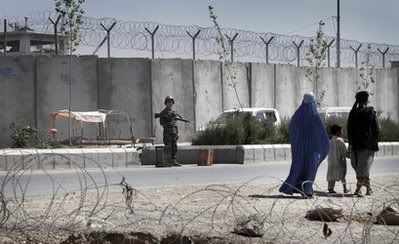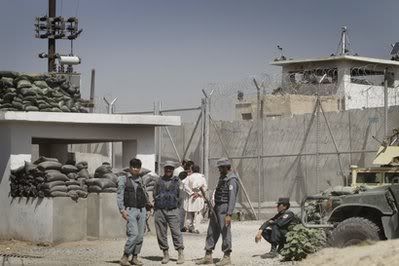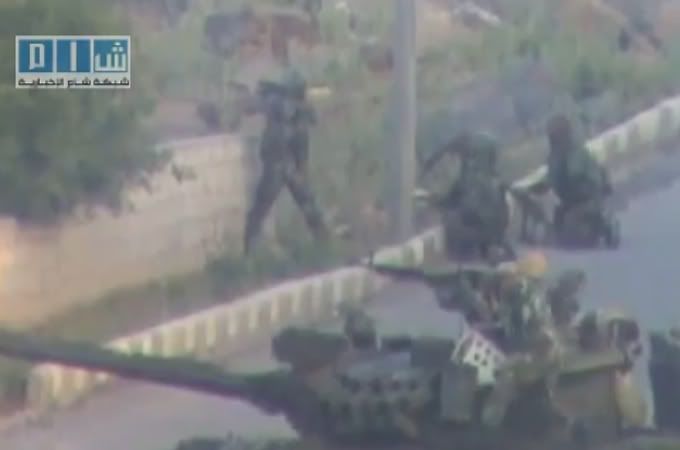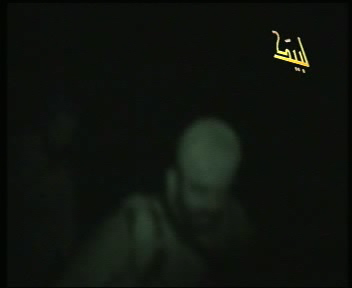
| This thread has been locked, it will not receive new replies. |
|
Locked on 05/04/2011 12:18:31 PM PDT by Admin Moderator, reason:
per request |
Posted on 03/30/2011 7:12:26 AM PDT by MestaMachine
Edited on 03/30/2011 12:16:23 PM PDT by Sidebar Moderator. [history]

|
|
They all scratch each others back and call it “Business is business”. But in the end they are all scrambling to get leverages monitarily, resource wise and food wise for when there is control of the financial markets from one center. Each one wants a place at that table, you can be sure of it, and as always those with the most money/assets and resources will come out on top.
As for the terrorists....well they are also being used as you know. Depends on which way the wind blows and whose in the fight behind the scene...and what’s on the table to win or loose at the moment.
This is an update.
Excerpt:
AMMAN – A Jordanian security official says Syria has sealed the border with Jordan and is preventing people from leaving the country.
The Jordanian border crossing lies close to the southern Syrian town of Daraa, where government forces were launching a sharp crackdown on protesters Monday. Some of the fiercest protests against the Syrian regime have taken place in Daraa.
The border closure may aim to prevent Syrian demonstrators and activists from feeling to nearby Jordan.
.
Excerpt:
KANDAHAR, Afghanistan – Taliban militants dug a lengthy tunnel underground and into the main jail in Kandahar city and whisked out more than 450 prisoners, most of whom were Taliban fighters, officials and insurgents said Monday.
The massive overnight jailbreak in Afghanistan's second-largest city underscores the Afghan government's continuing weakness in the south despite an influx of international troops, funding and advisers. Kandahar city, in particular, has been a focus of the international effort to establish a strong Afghan government presence in former Taliban strongholds.
 ...
...
The 1,200-inmate Sarposa Prison has been part of that plan. The facility has undergone security upgrades and tightened procedures following a brazen 2008 Taliban attack that freed 900 prisoners. Afghan government officials and their NATO backers have regularly said that the prison has vastly improved security since that attack.
But on Sunday night, about 475 prisoners streamed out of a tunnel that had been dug into the facility and disappeared into Kandahar city, prison supervisor Ghulam Dastagir Mayar said. He said the majority of the missing were Taliban militants.
"This is a blow," presidential spokesman Waheed Omar said. "A prison break of this magnitude of course points to a vulnerability." He did not provide details on the incident, saying that the investigation had just started.
The prison break also weakens the argument that the international troops are making good progress in handing over more responsibility for security to Afghan forces, which will eventually enable the coalition to leave. President Barack Obama plans to start drawing down forces in July.
The Kandahar escape is the latest in a series of high-profile Taliban operations that show the insurgency is fighting back strongly against the surge of U.S. and NATO forces. Over the past year, tens of thousands of U.S. and NATO reinforcements routed the Taliban from many of their southern strongholds, captured leading figures and destroyed weapons caches.
The militants have responded with major attacks across the nation as the spring fighting season has kicked off. In the past two weeks, Taliban agents have launched attacks from inside the Defense Ministry, a Kandahar city police station and a shared Afghan-U.S. military base in the east. In neighboring Helmand province on Saturday, a gunman assassinated the former top civilian chief of Marjah district, where U.S. Marines started the renewed push into the south. The victim, Abdul Zahir, was also deputy of the provincial peace council.
Taliban spokesman Zabiullah Mujahid said insurgents dug the 1,050-foot (320-meter) tunnel to Sarposa Prison over five months, bypassing government checkpoints and major roads. The diggers finally poked through to the prison cells Sunday night, and the inmates were ushered through the tunnel to freedom by three prisoners who had been informed of the plan, Mujahid said in a statement.
He said more than 500 inmates were freed, and that about 100 of them were Taliban commanders. The prisoners were led through the tunnel over four and a half hours, with the final inmates exiting around 3:30 a.m., all without drawing the attention of prison guards, Mujahid said. The insurgents said they then used a number of vehicles to shuttle the escaped convicts to secure locations.
Four of those who escaped were provincial-level Taliban commanders, said Qari Yousef Ahmadi, another Taliban spokesman.
The highest-profile Taliban inmates would likely not be held at Sarposa. The U.S. keeps detainees it considers a threat at a facility outside of Bagram Air Base in eastern Afghanistan. Other key Taliban prisoners are held by the Afghan government in a high-security wing of the main prison in Kabul.
A man who Taliban spokesmen said was one of the inmates who helped organize the escape from the inside said a group of inmates obtained copies of the keys to the cells ahead of time.
"There were four or five of us who knew that our friends were digging a tunnel from the outside," said Mohammad Abdullah, who said he had been in Sarposa prison for two years after being captured in nearby Zhari district with a stockpile of weapons. "Some of our friends helped us by providing copies of the keys. When the time came at night, we managed to open the doors for friends who were in other rooms."
He said they woke the inmates up four or five at a time to get them out quietly. Abdullah spoke by phone on a number supplied by a Taliban spokesman. His account could not be immediately verified.
There are guard towers at each corner of the prison compound, which is illuminated at night and protected by a ring of concrete barriers topped with razor wire. The entrance can only be reached by passing through multiple checkpoints and gates.
An Afghan government official who is familiar with Sarposa Prison said that while the external security has been greatly improved, the internal controls were not as strong. He said the Taliban prisoners in Sarposa were very united and would rally together to make demands from their jailers for better treatment or more privileges. He spoke anonymously because he was not authorized to talk to the media.
The area outside the prison was swarming with security forces — both Afghan and American — after the prison break. Many of the international troops were focused on a house nearby the prison — perhaps an indicator that it was the starting point for the tunnel. Police mounted a search operation Monday to recapture the prisoners and Omar said 13 had been caught by midday.
Asked how the tunnel was dug without anyone noticing, Wesa said only that the incident was still under investigation.
.
“Security” at Sarposa is, at best, laughable. We need be be gone from that place yesterday.
Excerpt:

More deaths have been reported in Syria where thousands of troops backed by tanks and heavy armour have swept into the volatile town of Deraa in the south of the country and the large Damascus suburb of Douma.
Security forces also continued a crackdown in the coastal town of Jableh for a second day.
Al Jazeera's Rula Amin, reporting from Damascus, said the government's offensive on Monday was an "unprecedented" offensive against the wave of dissent that has swept the country since the uprising began on March 15.
Witnesses in Deraa told news agencies on Monday that at least five people had been killed when gunmen opened fire on a car.
The vehicle was riddled with bullets, a witness told AFP. Intense gunfire could be heard reverberating across the town, he added.
"The minarets of the mosques are appealing for help. The security forces are entering houses. There is a curfew and they fire on those who leave their homes. They even shot at water tanks on roofs to deprive people of water," he said.
Al Jazeera is unable to confirm the reported deaths.Thousands of soldiers swept into the town in the early hours of Monday, with tanks taking up positions in the town centre and snipers deploying on rooftops, witnesses said.
"Bodies are lying in the streets and we can't recover them," one activist said, explaining that they have little idea of the total number of casualties.Footage aired by an opposition news organisation on Monday, transmitted via satellite, appeared to show Syrian military firing at unseen targets with sniper rifles. Al Jazeera is unable to verify the veracity of the footage.
Security forces loyal to Bashar al-Assad, the country’s president, also stormed Douma early on Monday, shooting at unarmed civilians and arresting residents, rights campaigners said.
"There are injured people. Scores have been arrested. The security are repeating the same pattern in all the centres of the democratic uprising. They want to put down the revolution using the utmost brutality," an unidentified rights campaigner in Damascus told the Reuters news agency.
Douma has been the site of many large protests since the uprising against Assad began in Syria earlier in the year.
And in Jableh, security forces continued a crackdown that began the previous day.
"Jableh is surrounded by security forces," the witness said, speaking by telephone. "The dead are in the mosques and the houses. We can't get them out."
At least 13 people had been killed in Jableh since Sunday, the Syrian Observatory for Human Rights said on Monday morning.
Syria closed all border crossings on its southern frontier with Jordan as the military launched its operation in nearby Deraa, Al Jazeera learned from a security offical.
Amin reported checkpoints and heavy security in central Damascus.
Syria has banned nearly all foreign media and restricted access to trouble spots since the uprising began, making it nearly impossible to get independent assessments.
Al Jazeera's correspondent said that the events on Monday marked a change in methods by security forces.
Up until now, she said, security forces have cracked down in reaction to protests. But the flood of troops into Douma and Deraa had come in the absence of any demonstrations.
"Today, we're seeing a different tactic with security forces sweeping the towns," she said, noting reports of house-to-house searches, arrests and random shooting coming from both towns.
Communications were cut off and, for the first time, the military has become directly involved in quelling the uprising, much to the disappointment of opposition activists.
"They were hoping the army would not get involved," Amin reported. "They feel this is only the beginning of a very serious crackdown."
Yet one activist told Al Jazeera the some army officers have defected to fight with the people of Deraa against the regime.
Two members stepped down from the provincial council in the southern region of Daraa, which has the highest death toll in the country. The resignations came a day after two lawmakers and a religious leader from Daraa also turned their backs on Assad in disgust over the killings.
Meanwhile, Syrian intellectuals expressed their outrage over the violence, with a declaration on Monday signed by 102 writers and exiles from all the country’s main sects.
The declaration called on Syrian intellectuals "who have not broken the barrier of fear to make a clear stand.
"We condemn the violent, oppressive practices of the Syrian regime against the protesters and mourn the martyrs of the uprising."
Signatories included Alawite figures such as former political prisoner Loay Hussein; female writers Samar Yazbek and Hala Mohammad; Souad Jarrous, correspondent for the pan-Arab daily al-Sharq al-Awsat; writer and former political prisoner Yassin al-Haj Saleh and filmmaker Mohammad Ali al-Attassi.
Mansour al-Ali, a prominent Alawite figure from the city of Homs, was arrested in his home city after he spoke out against the shooting of protesters, another activist in Homs said.
At least 352 people have been killed in Syria since protests began, according to figures compiled by AFP.
And Wissam Tarif, executive director of INSAN, a Syrian human rights group, said that according to the organisation's most recent count on Friday there were 221 "forcefully disappeared people" in Syria.
The top United Nations human rights official called on Syria on Monday to rein in its security forces and investigate nearly 100 killings of protesters reported over the weekend.
Navi Pillay, the UN High Commissioner for Human Rights denounced the escalation of violence in the country and called for detained activists and political prisoners to be released.
"The first step now is to immediately halt the use of violence, then to conduct a full and independent investigation into the killings, including the alleged killing of military and security officers, and to bring the perpetrators to justice," he said in a statement.
Iran says it has detected second cyber attack
Excerpt:
Gholamreza Jalali told the semi-official Mehr news agency that the new virus, called "Stars," was being investigated by experts.
"Fortunately, our young experts have been able to discover this virus and the Stars virus is now in the laboratory for more investigations," Jalali was quoted as saying. He did not specify the target of Stars or its intended impact.
"The particular characteristics of the Stars virus have been discovered," Jalali said. "The virus is congruous and harmonious with the (computer) system and in the initial phase it does minor damage and might be mistaken for some executive files of government organisations."
Jalali warned that the Stuxnet worm, discovered in computers at Iran's Bushehr nuclear reactor last year, still posed a potential risk. Some experts described it as the world's first "guided cyber missile," aimed at Iran's atomic program.
Iranian officials said they had neutralized Stuxnet before it did the intended damage to its nuclear facilities. They blamed Israel and the United States -- which believe Iran is seeking nuclear weapons -- for the virus.
STUXNET RISK
The existence of Stuxnet became public knowledge around the time that Iran began loading fuel into Bushehr, its first nuclear reactor, last August. Iran said in September that staff computers at Bushehr had been hit but that the plant itself was unharmed.
Bushehr is still not operational, having missed several start-up deadlines. This has prompted speculation that Stuxnet damaged the plant, something Iran denies.
Officials have said the virus could have posed a major risk had it not been discovered and dealt with before any major damage was done.
Some defense analysts say the main target was more likely to be Iran's uranium enrichment program. Enrichment creates fuel for nuclear power plants or, if pursued to a much higher degree, can provide material for an atomic bomb.
Jalali said Stuxnet might still pose a risk. "We should know that fighting the Stuxnet virus does not mean the threat has been completely tackled, because viruses have a certain life span and they might continue their activities in another way."

Note that the Chechnya jihad clearinghouse now seems to function as an overall information hub for all Al Quaida and Taliban.
>ALLAH ALL-SEEING SAYS:
“And (remember) when the disbelievers plotted against you (O Muhammad SAW) to imprison you, or to kill you, or to get you out (from your home, i.e. Makkah); they were plotting and ALLAH too was plotting, and ALLAH is the Best of those who plot.”
(QUR’AN, SURA AL-ANFAAL, VERSE.30)<
allah needs to plot. Isn’t this an admission that their all-seeing transgendered “god’ is a mere thug right out of the fevered, drug-induced hallucinations of its pedophile prophet?
The mafia plots. Terrorists plot. Corrupt politicians plot.
Why would an all-seeing, all-knowing “god” find it necessary to plot?
“Security” at US / Government installations in Afghanistan has been a bad joke for as long as I can remember. I’ll prepare a small compilation of the stuff.

Thanks for the ping.
Thanks for the pings/posts/information. Catching up to thread, again. 800-current placemark BUMP (a little more backtracking to go).
TM BUMP!
WOW!!! That’s a whole lotta reading to catch up on! Here I am, slaving over the hot stove, and no one shows up for dinner. Wah! LOL
First one up here is going to be “Escape from Bagram”, in which Yahia al Libi along with ten or so others escaped from Bagram Prison - they filmed themselves tippy-toeing past oblivious guards and out to freedom.
Of course, the media had its hand in the debacle, having already published a detailed map of the Bagram facilities.


The Bagram escape. Orchestral maneuvers in the dark, with film team. How the Bagram guards failed to detect an escaping bunch of people with a film camera is very odd, but the escape was planned, and well, in advance. The escapees had supplies and stuff waiting.
Later, bagram became the focus of persistent, large-scale and almost daily data thefts to the point that some poor army bugger had to get the job of trawling the local market to buy back harddrives and thumbdrives, which were routinely used for unencrypted storage of sensitive (life-and-death sensitive) data. I don't think they ever managed to cure the problem of soldiers leaving those things floating around, in spite of "security courses".
Thanks, boss!
OORAH!
Disclaimer: Opinions posted on Free Republic are those of the individual posters and do not necessarily represent the opinion of Free Republic or its management. All materials posted herein are protected by copyright law and the exemption for fair use of copyrighted works.